Charles King, president and CEO of the New York-based advocacy group Housing Works, wrapped up an evening of celebration dedicated to AIDS activism on April 17 by reminding the audience that activism is something that can be done each day by ordinary people.
If his hope was to inspire those sitting in the seats of the Times Center in New York City to become more involved in helping people with HIV/AIDS, the recipients of the 2008 Keith D. Cylar AIDS Activist Awards, who had joined King on the stage
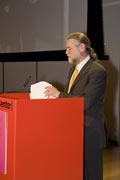 | |
| Housing Works President and CEO Charles King |
“None of them has found fame, much less fortune,” King said of the evening’s five awardees, honored for their commitment to tackling the AIDS epidemic around the world—from Saint-Marc, Haiti to Fajardo, Puerto Rico, to the setting of the gala event: midtown Manhattan. “Rather, they are ordinary, even humble, [and] when confronted with AIDS each one has chosen to act not once, but again and again, on behalf of others.”
The evening’s honorees included: Esther Boucicault, the winner of the International AIDS Activist Award for making waves in her hometown of Saint-Marc, Haiti, when she went public with her HIV status in 1998; G. Gonzalez, winner of the National AIDS Activist Award, who works with injection-drug users in Fajardo, Puerto Rico; Diane Williams, who received the Housing Works AIDS Activist Award and who is the assistant to Housing Works’ CFO and Senior Vice President Andrew Coamey; and Asia Russell and Paul Davis, winners of the Virginia Shubert Courage Award for their work with the human rights and AIDS advocacy group Health GAP.
The ceremony’s emcee—journalist and television personality Beverly “Bevy” Smith—said that the evening was not one of sadness about the HIV/AIDS epidemic, but instead a celebration of the achievements of the five activists being honored in the name of Housing Works cofounder Keith Cylar,
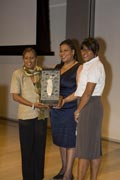 | |
| Esther Boucicault (l.) accepts heraward |
“[This] is a big honor because I see that there are people who think about us,” Boucicault told POZ. Her organization, the Fondation Esther Boucicault Stanislas, works to provide assistance for HIV-positive people in Haiti, where stigma surrounding the virus is rampant, and extreme poverty often makes it difficult for positive people to get the food, care and services they need. The foundation works to provide micro loans to help HIV-positive Haitians learn sustainable crafts and attain jobs so they can provide for themselves and their families. “Being infected also means staying positive,” Boucicault said. “Being infected implies choosing new ways of life.”
Boucicault and Gonzalez each received $10,000 grants from the Keith D. Cylar AIDS Activist Fund to help them continue their fight against HIV/AIDS. Gonzalez (who asked that her first name not be used because of stigma surrounding the virus in Puerto Rico) will use her grant to help achieve her goal of stopping the spread of the virus through injection-drug use. Gonzalez, a former drug user who was diagnosed with HIV in the early ’90s, takes food, clothing and other necessary items to a housing project in Fajardo, Puerto Rico, where many drug users gather—supplies that she feels can help injection-drug users avoid becoming infected with HIV.
“[People] don’t really want to see how big the problem of drug use is,” Gonzalez says. “Addiction is a tree, and drug us is just one branch. But have you dealt with the other branches, such as mental-health issues, abuse, rape, alcoholism and illiteracy…? The easiest part of [tackling] addiction is to stop using.”
Awardees Asia Russell and Paul Davis received the year’s Courage Award,
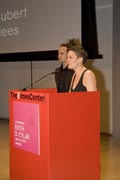 | |
| Paul Davis and Asia Russell of Health GAP |
Housing Works’ own Diane Williams, who began as a client at the organization in 1994, told her story about the isolation she faced when she and her daughter were diagnosed with HIV in the late ’80s. In 2003, Williams graduated from Housing Works’ Second Life Job Training program, which she says showed her that she was “more than an HIV diagnosis.” Since then, she’s worked as the administrative assistant to the chief financial officer/senior vice president for Housing Works. But her passion for AIDS activism has regularly taken her out of the office and onto the streets to stand up, rally and even get arrested as she fights the same stigma and injustices today that she faced 20 years ago. The $5,000 Cylar grant she has received will help fuel her ongoing fight.
“It’s still happening,” Williams told POZ. “But I believe ordinary people can make miracles happen. Anybody can go out there and do what
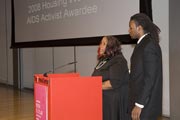 | |
| Diane Williams and her sonReggie |
Whether it’s listening when someone needs a friend, motivating the AIDS community to ACT UP, providing support for those battling addiction or working for the dignity of HIV-positive people living in extreme poverty, the five Cylar Award winners make it clear that activism comes in many forms. And though they all have just a bit more fame after the gala—and for some, even a bit more fortune—the awardees are an inspiration to us all as they return to the front lines to continue their very humble fights against the epidemic and for people living with HIV.
Photos courtesy of Housing Works



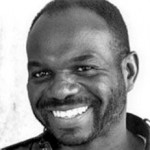


1 Comment
1 Comment